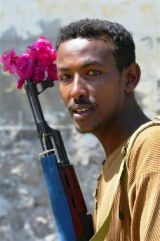AU team seeks safe shelter for regional peacekeepers in Mogadishu
MOGADISHU, Feb 16 (AFP) — An African Union (AU) team assessing security in Somalia ahead of the deployment of regional peacekeepers met with hardline Islamic clergy here Wednesday in a bid to negotiate the force’s safety.

|
|
A gunman carries a flower in his gun barrel, on Feb. 5, 2005 in Mogadishu, Somalia. (AP). |
The team, which arrived in lawless Mogadishu on Monday, saw Barud Gurhan, a representative of the clerics, many of whom have been vocal in their opposition to the presence of any foreign troops in Somalia, an AFP correspondent said.
The AU mission had been delayed last week after the murder of a BBC journalist in Mogadishu sparked new security fears in the bullet-scarred capital.
The AU has authorized the east African Inter-Governmental Authority on Development (IGAD) to deploy several thousand troops to Somalia to assist the war-shattered country’s transitional government in eventually relocating there from exile in Kenya.
That force would later be replaced by a larger AU operation but while most Somalis favor the deployment of IGAD troops, they refuse participation of soldiers from Ethiopia, Djibouti and Kenya.
No details were released of the closed-door meeting between Gurhan and the AU team but the delegation also visited a Somali police academy, the presidential palace and the ramshackle Mogadishu port where the troops will be stationed, the AFP correspondent said.
IGAD, which earned respect after successfully negotiating the peace deal that ended 21 years of fighting in Sudan, is composed of Kenya, Uganda, Djibouti, Eritrea, Sudan, Ethiopia and nominally Somalia.
Only Ethiopia and Uganda have thus far committed to sending troops. Djibouti and Eritrea are still undecided while Kenya has only promised observers.
A similar stabilization attempt in mid-1990s by UN and US missions failed miserably after they were sucked into interclan warfare, resulting in the deaths of 140 UN peacekeepers, 18 US special forces and thousands of Somalis.
Meanwhile Wednesday, a fact-finding mission from the transitional government toured the northern town of Jowhar and the southern capital of Baidoa to lobby popular support from the deeply divided population.
Education Minister Ali Abdullahi Osoble, leading the team in the north, said roaming gunmen could only be disarmed by the regional force.
“If the Somalis can actually disarm themselves, they could have done that in the course of 14 years,” Osoble said, referring to the past decade-and-a-half of conflict the country has seen since.
“The participation of troops from neighboring countries will be a milestone in the operation to pacify Somalia,” he said.
Mohamed Omar Habeb, the self-proclaimed governor for Jowhar region, told AFP that the opposition to troops from certain states was actually a plot by some elements to foment bad blood between Somalia its neighbors.
“Those who reject those forces from Somalia’s neighbors are misguided by ungrateful elements who want to spoil relations between Somalia and its immediate neighbors,” he said.
Somalia was plunged into chaos after the fall of President Mohamed Siad Barre in 1991. Gedi’s transitional government was set up in October in a bid to restore a functioning central government in the war-wracked nation.
But the administration — including a president, government and parliament — have remained in exile in Kenya since for security reasons.
